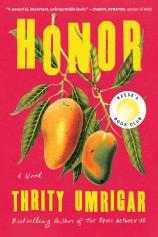Honor
Review
Honor
HONOR is a perfect title for Thrity Umrigar's powerful novel about India and the horrors that are perpetrated in rural areas in the name of religion and honor. Umrigar makes it clear that while India is the setting for this tragic story, the prejudice and hatred toward women and others who are deemed less than worthy are not confined to a particular country.
Smita is a journalist who comes back to India, where she and her family had fled decades before, to assist a colleague in need. But after arriving in Mumbai, Smita is dismayed to realize that her friend doesn't want her help personally, but expects her to cover a story she’s been working on. Smita has very mixed feelings about returning to the country of her childhood. Umrigar deftly creates an enigma as we grow to understand that something tragic happened to cause Smita and her loved ones to flee, but it's shrouded in mystery while we view India through her admittedly prejudiced eyes.
Smita's assignment concerns Meena, a Hindu woman who fell in love with a Muslim man, Abdul. While most of the novel is told from Smita's point of view in third person, Meena shares her love story in first person. The narrative is intensely moving and recounts a “Romeo and Juliet” tragedy. After Meena elopes with Abdul and lives with him for four blissful months in his village, she gets pregnant. When they tell her brothers their happy news, hoping that such joyful tidings will soften their hearts, they fly into a rage.
We read about how completely and rabidly the Hindus in their small town hate the Muslims. In the rural area where they all reside, it's as if time has frozen for hundreds of years. They believe in magic and that the village chief, a hateful man named Rupal, talks directly to God on his phone. If Rupal warns the local police to stay away from a crime scene, they obey.
"HONOR is a moving account of the multifaceted layers that are India --- both the beauty and the ugliness. It's a novel that screams 'book club' because of its thoughtful and beautiful prose and the essential points it raises."
So when Meena's husband is doused with gasoline and set on fire, no one intervenes. Meena tries to put out the flames with her hands, which causes her to be severely injured and horribly maimed. A lawyer convinces her to sue her evil brothers for Abdul's death, and she bravely agrees to do so. We learn about the ubiquitous corruption of the police and their refusal to do anything to help Meena. Abru, Meena's daughter, is cursed by both Hindus and Muslims as she is neither and both at the same time. To Meena, Abru is the culmination of her love for Abdul, and she will do anything for Abru. They live with Abdul's mother, who abuses Meena and berates her, blaming her for what happened to Abdul.
There are multiple layers to this novel. On one level, it's the story of rural India and the twin horrors of misogyny and religious fanaticism. At one point, I was reminded of the oft-repeated saying of Lyndon Johnson: “If you can convince the lowest white man he's better than the best colored man, he won't notice you're picking his pocket. Hell, give him somebody to look down on, and he'll empty his pockets for you.” Here we see that even the poorest, most pathetic man feels powerful because he can look down on any woman. And any Hindu man is able to subjugate not only women, but Muslims even more. Smita is frustrated when she cannot even sign for a hotel room when they visit Meena. Umrigar mentions the "clerk's casual misogyny" and writes, "This was the real India, revealing itself to her in small slights and grave tragedies."
Yet on another level, the story is about Smita and Mohan, her colleague's friend who becomes her escort and driver into the rural area where she must interview Meena and go to court when the case is decided. They are thrown together, and the friction is apparent. Through Smita's eyes, Mohan is forced to acknowledge the parts of India to which he had been blind, growing up with privilege as the son of a wealthy diamond merchant. Outside of Mumbai, his beloved India is not modern and urbane, but rather filled with the prejudice of the caste system, the horror of religious fervor and its attendant violence, and the repugnant corruption of not only the police but also the judicial system.
Umrigar's writing cuts us like a knife. She forces us to look at the horrors done in the name of honor, and makes us realize that while we smugly believe we are better than those in rural third world countries, that is not the case. When the lawyer tells Smita that the village chief is a monster, Umrigar compels us to face that truth:
"Monster, Demon, Satan. In Smita's line of work, people often bandied around such terms to explain away horrendous behavior. Every time there was a mass shooting in America, for instance, there was a rush to label the shooter a crazed monster, rather than place him within the context of a culture that fetishized guns. Every time a cop shot dead a black man, there was an attempt to paint him as a rogue cop. But what about the millions of otherwise normal people who were recruited to massacre strangers during a war? Were they all evil? How alarmingly easy it had been to get millions to participate in genocide during both the Holocaust and Partition. Human beings could apparently be turned into killers as effortlessly as turning a key. All one had to do was use a few buzzwords: God. Country. Religion. Honor. No, men like Rupal were not the problem. The problem lay with the culture from which they bubbled up."
In spite of the violence and brutality of the deaths here, Umrigar's message seems ultimately hopeful: Through small steps, by refusing to accept cruelty and bigotry, change will happen. But she also recognizes that women bear the brunt of the violence. Depressingly, she writes that "it seemed to Smita that the history of the world was written in female blood." Rape, domestic violence, female genital mutilation, and women being frightened, isolated and abused are not limited to any country. Smita, whose job has taken her all over the world, understands that as much as anyone could.
HONOR is a moving account of the multifaceted layers that are India --- both the beauty and the ugliness. It's a novel that screams "book club" because of its thoughtful and beautiful prose and the essential points it raises.
Reviewed by Pamela Kramer on January 21, 2022
Honor
- Publication Date: October 18, 2022
- Genres: Fiction, Women's Fiction
- Paperback: 352 pages
- Publisher: Algonquin Books
- ISBN-10: 1643753304
- ISBN-13: 9781643753300




